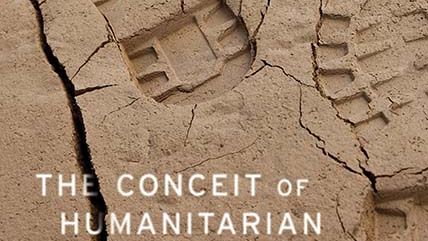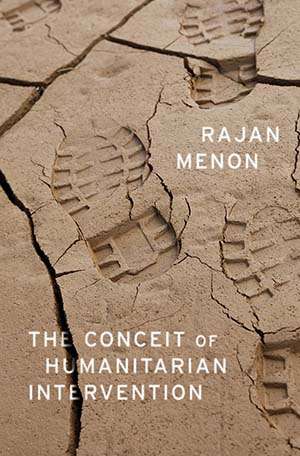Don't Just Do Something!
"Humanitarian" interventions often lead to increased harm.

The Conceit of Humanitarian Intervention, by Rajan Menon, Oxford University Press, 224 pages, $27.95
"We knew that if we waited one more day, Benghazi—a city nearly the size of Charlotte—could suffer a massacre that would have reverberated across the region and stained the conscience of the world." Barack Obama's rationale for intervening in Libya in 2011 is a succinct summary of the logic of humanitarian intervention: When mass atrocities occur, it suggests, the world community has a responsibility to intervene.
That intervention ended up exacerbating rather than ending the conflict, and Libya has since dissolved into chaos and grinding violence. Tens of thousands of people have died, and a second civil war launched in 2014 is still ongoing.
In The Conceit of Humanitarian Intervention, City College of New York political scientist Rajan Menon argues that such disastrous missteps are common. When nations set out to salve "the conscience of the world," they often end up staining it more. "Humanitarian interventions," Menon writes, "like war in general, produce many unforeseen and unintended consequences that their architects ignore or dismiss, whether from ignorance or arrogance."
The argument for humanitarian intervention is based on the idea that there is a broad international consensus condemning mass atrocities and sanctioning military action to stop them. Following the failure to intervene in Rwanda in 1994 and Srebrenica in 1995, international institutions such as the United Nations developed a theory called "Responsibility to Protect," or R2P. This doctrine holds that state sovereignty is limited and that the global community has an obligation to step in when rulers commit mass atrocities against their own people. The U.N. officially adopted R2P at its World Summit in 2005.
But in practice, Menon argues, there is no consensus. Sometimes world powers—especially the United States—will launch a military action citing humanitarian concerns, as in Libya. But such actions are always overdetermined by a careful calculation of national interests. Humanitarian interventions aren't always as well-intentioned as they seem; at best, the good intentions are balanced by other considerations.
North Korea is surely one of the worst violators of human rights in the world. The U.S. does not invade North Korea, however, because the country has nuclear weapons. Similarly, America can be counted on never to invade China or Russia, no matter what atrocities they commit. Nor, for that matter, would China, Russia, or Canada invade the U.S. in a bid to stop, say, mass incarceration. If a nation is strong enough militarily, it can commit whatever foul deeds it wishes. Only weak nations need fear "humanitarian" intervention.

As a result, Menon writes, "Much of the world fears and suspects that the effort to legitimate humanitarian intervention by means of supposedly universal norms is designed to camouflage the pursuit of power by the powerful." The Libya invasion, which was originally sold as a means to prevent Muammar Gadhafi from slaughtering his own people, ended up deposing the government, raising suspicions in both China and Russia that R2P was little more than an excuse for regime change. Menon doesn't quite say that this interpretation of the intervention is correct. But he points out that humanitarian motives are generally mixed up with, and predicated upon, political considerations. Great powers do not act on altruism alone, and to the extent the R2P doctrine suggests they do, it is duplicitous.
It's not just strong nations that are immune to military censure. Countries that have entered into strategic alliances with the U.S. are also considered out-of-bounds. In 2011, at the same time the world was gearing up to invade Libya, the Bahrainian regime was brutally repressing unarmed citizens as they protested for political rights. But as Menon points out, "the United States has important strategic interests in Bahrain that any Washington administration will be determined to protect: the U.S. Fifth Fleet is headquartered there." In Libya, by contrast, Gadhafi's erratic behavior had isolated him in the region and alienated him from the U.S. He was ultimately removed because of his diplomatic failures, not his human rights violations.
Needless to say, the United States has backed numerous horrific regimes over the years, even passing intelligence to Suharto in Indonesia to help him commit atrocities against the Communists and others. This tradition hasn't ended with the rise of Responsibility to Protect. Saudi Arabia, a nation in which women are not even allowed to drive, is still one of America's closest allies in the Middle East. The U.S. also subsidizes the Saudi-sponsored war in Yemen, which has been a human rights catastrophe.
The fact that the world community condones human rights violations in some instances isn't necessarily an argument against humanitarian intervention in others. Just because the U.S. didn't intervene in Rwanda doesn't mean it was wrong to do so in Kosovo.
Unfortunately, as Menon explains, the hypocrisy around humanitarianism has perhaps even more dire consequences when interventions are actually launched. Because people are leery of committing troops and cash to fight wars for people on the other side of the globe, governments that intervene are generally more worried about political fallout at home than they are about their ostensible mission of saving lives. "No convincing evidence suggests that people are willing to undergo major hardships, spend a lot of money, or see many of their soldiers die in order to save strangers," Menon comments drily.
In Libya, Menon says, the refusal to commit ground troops and the "preoccupation with avoiding casualties" among coalition forces "resulted in an increase of the number of civilians maimed or killed." Before NATO intervened, about 1,000–2,000 Libyans were killed in fighting; in the eight months after intervention, 10 times that number at least were killed. Humanitarian commitments also rarely extend to reconstruction following regime change. Sometimes, as in Libya, virtually no provisions are made for rebuilding. Other times, as in Iraq, even an expensive occupation is insufficient to bring about stability. Either way, it's much easier to remove an authoritarian ruler than it is to create a stable society afterward.
It's no accident that domestic criticism of America's handling of Libya focuses on an embassy attack in Benghazi that killed a handful of Americans, rather than on the tens of thousands of Libyans who have suffered and died because of Washington's callous and misguided policies. Dropping bombs on people you don't much care about in the name of "humanitarianism" rarely results in humane outcomes. Even in Kosovo, generally touted as a singular success, the result of the intervention was not clearly positive. In fact, the Kosovo Liberation Army, after witnessing NATO intervention in Bosnia, deliberately started attacking Serb civilians in the hopes of escalating the conflict and pushing NATO to intervene. When NATO did enter the conflict, it used only airstrikes, giving the Serbs the time and incentive to speed up attacks. More Kosovars were killed and expelled following the beginning of NATO airstrikes than before they were launched.Intervention creates dangerous incentives and unexpected fallout. Even in cases involving murderous regimes, outsiders with little real commitment to the lives they're purportedly saving can make things much worse rather than better. More than a decade on, it seems clear that, awful as he was, Saddam Hussein was less of a blight upon Iraq than the American war and the chaos it wrought.
So what can be done about mass atrocities? If humanitarian intervention doesn't work, how can nations prevent genocide and other acts of large-scale killing? Should the U.S. simply shrug its shoulders when dictators like Gadhafi persecute their own people?
In practice, the U.S. does often shrug its shoulders; no one is suggesting that America invade Burma, which has declared its Rohingya Muslim inhabitants to be nonpeople, causing Amnesty International to name the group "the most persecuted refugees in the world." Still, if Washington wanted to do more to help the people of the world, there are less dangerous options. As Menon points out, the United Nations Refugee Agency asked the international community for $1.1 billion to deal with the Syrian refugee problem in 2013; it received less than a fifth of that. Foreign aid, for all the corruption that often accompanies it, at least does less damage than sending in tanks or dropping bombs. An even simpler—and more effective—option is to lower trade barriers, so that developing countries aren't at a disadvantage in exporting raw materials and products. Had tariff reduction been undertaken in the 1970s, Menon argues, the economic growth in poor countries would have "helped them gross a sum approximating the amount they receive annually in foreign aid, which, in 2013, totaled $134 billion."
These options are politically difficult, because national interests are much more powerful than altruistic feelings toward nonvoters living on the other side of the globe. But it takes a lot of lobbying, money, energy, and time to make the case for humanitarian military intervention too. It's telling which one receives more effort and resources.
This article originally appeared in print under the headline "Don't Just Do Something!."


Show Comments (15)